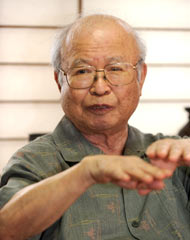Novelist describes his memory of the land taken by the U.S. military

At his home in Naha City on June 7, Tatsuhiro Oshiro said, “The protests of the Okinawan people are linked to the memory of their land.”
June 9, 2011, Ryukyu Shimpo,
Eighty-five year-old Tatsuhiro Oshiro, an Akutagawa Prize-winning writer, will publish his anthology of short stories Futenma yo through Shinchosha Co., Ltd. in mid-June. Futenma yo, is the overarching name of seven short stories written specifically for this publication.
The piece squarely addresses the problems surrounding the Futenma Air Station, such as the constant roar of planes over Ginowan City, the crash of a U.S. military helicopter at Okinawa International University, and the relocation of Futenma Air Station to Henoko, Nago City.
Oshiro said, “The protests of the Okinawan people are intrinsically linked to their memory of what was their land. The Futenma issue goes back to the identity of the Okinawan people who seek the return of the land that was taken from them by the U.S. military.”
His previous anthology of short stories is made up of pieces written using the motif of the war, with titles such as Natsukusa yo and Genei no Yukue.
His new work, Futenma yo, is set in Aragusuku, Ginowan City, which borders on Futenma Air Station. The plot develops around the memories of old settlements taken over by the U.S. military bases.
The protagonist’s grandmother confesses him her desire to enter Futenma Air Station in order to dig up the remains of the old settlement to try to find her tortoise-shell comb that had been in the family for generations. While his parents are bewildered by the grandmother’s stubborn determination, the protagonist tries to fulfill her wish.
The story is full of scenes in which U.S. airplanes suddenly roar through the sky.
His grandmother gets the protagonist’s family to understand the irrational fact that the U.S. military have taken over land that the family had inherited from its ancestors, and that U.S. aircraft rule once safe skies. Through the eyes of three generations, the story highlights the struggle against the U.S. military bases in the daily lives of the people of Okinawa.
With regard to the Futenma issue, Oshiro commented, “The grandmother’s desire to regain the land taken by the U.S. military is unremitting. The Japanese government may try to pull the wool over the eyes of the Okinawan people, but the locals’ attitude towards the bases is indomitable. The protests will continue.”
(English Translation by T&CT, Mark Ealey)
Previous Article:Sutsuupunaka: celebration of a full harvest in Tarama Village
Next Article:Heads of 38 municipalities oppose the deployment of MV-22 Osprey at Futenma Air Station
[Similar Articles]
- Fourth-generation Okinawan descendant from New Caledonia meets her Okinawan relatives
- People gather at 11th anniversary of US helicopter crash on Okinawa International University
- Tatsuhiro Oshiro, first Okinawan to win Akutagawa Prize for work on postwar Okinawa, dies at 95
- Okinawa marks 40th anniversary of return to Japan Prime Minister pledges not to allow Futenma base to become a permanent fixture
- Plaintiffs of Futenma helicopter roar suit call for more residents to put their hands up
 Webcam(Kokusai Street)
Webcam(Kokusai Street)


